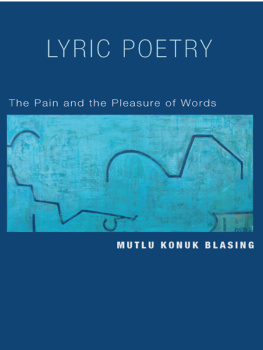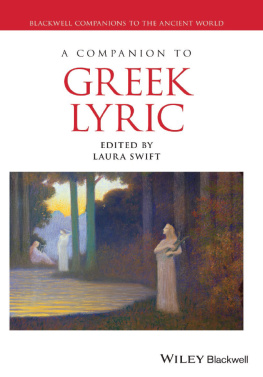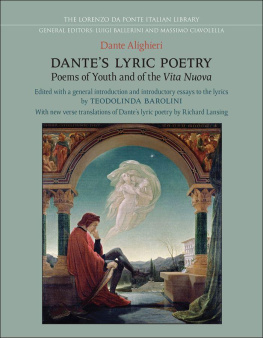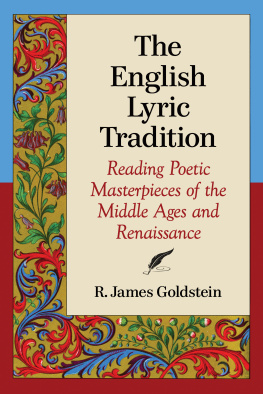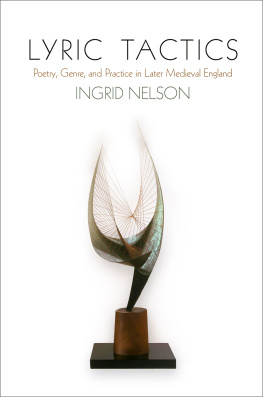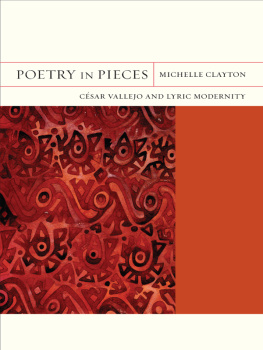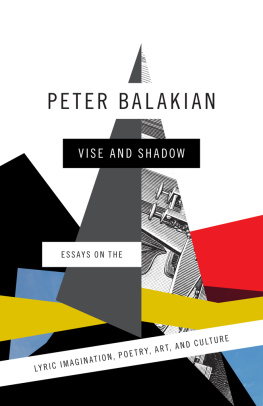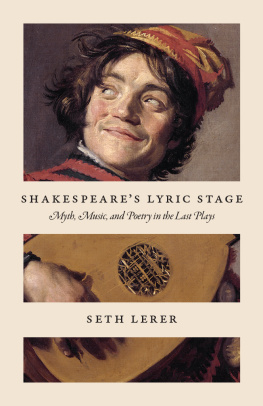Blasing - Lyric Poetry
Here you can read online Blasing - Lyric Poetry full text of the book (entire story) in english for free. Download pdf and epub, get meaning, cover and reviews about this ebook. year: 2008, publisher: Princeton University Press, genre: Home and family. Description of the work, (preface) as well as reviews are available. Best literature library LitArk.com created for fans of good reading and offers a wide selection of genres:
Romance novel
Science fiction
Adventure
Detective
Science
History
Home and family
Prose
Art
Politics
Computer
Non-fiction
Religion
Business
Children
Humor
Choose a favorite category and find really read worthwhile books. Enjoy immersion in the world of imagination, feel the emotions of the characters or learn something new for yourself, make an fascinating discovery.
- Book:Lyric Poetry
- Author:
- Publisher:Princeton University Press
- Genre:
- Year:2008
- Rating:3 / 5
- Favourites:Add to favourites
- Your mark:
- 60
- 1
- 2
- 3
- 4
- 5
Lyric Poetry: summary, description and annotation
We offer to read an annotation, description, summary or preface (depends on what the author of the book "Lyric Poetry" wrote himself). If you haven't found the necessary information about the book — write in the comments, we will try to find it.
Lyric Poetry — read online for free the complete book (whole text) full work
Below is the text of the book, divided by pages. System saving the place of the last page read, allows you to conveniently read the book "Lyric Poetry" online for free, without having to search again every time where you left off. Put a bookmark, and you can go to the page where you finished reading at any time.
Font size:
Interval:
Bookmark:
LyricPoetry

LyricPoetry

THE PAIN AND THE PLEASURE OF WORDS
Mutlu Konuk Blasing
PRINCETON UNIVERSITY PRESS
PRINCETON AND OXFORD
Copyright 2007 by Princeton University Press
Published by Princeton University Press, 41 William Street,
Princeton, New Jersey 08540
In the United Kingdom: Princeton University Press, 3 Market Place,
Woodstock, Oxfordshire OX20 1SY
Requests for permission to reproduce material from this work should be sent to Permissions,
Princeton University Press.
All Rights Reserved
LIBRARY OF CONGRESS CATALOGING-IN-PUBLICATION DATA
Blasing, Mutlu Konuk, 1944
Lyric poetry : the pain and the pleasure of words / Mutlu Konuk Blasing.
p.cm.
Includes bibliographical references and index.
eISBN: 978-1-40082-741-1
1. Lyric poetryHistory and criticism. I. Title.
PN1356.B63 2006
809.1'04dc222005056497
British Library Cataloging-in-Publication Data is available
Permission to reprint the following material is gratefully acknowledged:
Excerpts from Burnt Norton, from Four Quartets by T. S. Eliot, copyright 1936 by Harcourt, Inc. and renewed 1964 by T. S. Eliot. Reprinted by permission of the publisher.
"The Tree" by Ezra Pound, from Personae, copyright 1926 by Ezra Pound. Reprinted by permission of New Directions Publishing Corporation.
Excerpt from "Said the Poet to the Analyst," from To Bedlam and Part Way Back by Anne Sexton. Copyright 1960 by Anne Sexton, renewed 1988 by Linda G. Sexton.
Reprinted by permission of Houghton Mifflin Company. All rights reserved.
This book has been composed in Adobe Caslon
Printed on acid-free paper.
pup.princeton.edu
Printed in the United States of America
13579108642
For John

CONTENTS
ACKNOWLEDGMENTS
I AM GRATEFUL TO Randy Blasing for his encouragement and many useful suggestions through the years; to Nancy Armstrong, for her support and helpful comments; to Hanne Winarsky, whose interest in this book made it possible; to Ellen Foos and Kathleen Cioffi, for seeing it into print; and, finally, to both readers for Princeton University Press, whose responses were invaluable to me as I made my final revisions.
Lyric Poetry

Introduction

"MAKING CHOICE OF A HUMAN SELF"
It is the human that is the alien.
Wallace Stevens
POETRY HAS PRESENTED a problem for disciplinary discourse from the beginning. There is an ancient quarrel between philosophy and poetry, Plato declares; he gives no evidence and makes no argument as to why poetry would have a quarrel with philosophy, but his own discourse offers clear evidence of philosophy s issue with poetry. Poets are banned from the Republic, ostensibly on the grounds that mimetic fictions are imitations of imitations and thus twice removed from Truth. This threat to the discourse of Truth would not in itself pose a practical danger if it didn't also appeal to something within us that does: these productions which are far removed from truth... are also the companions and friends and associates of a principle within us which is equally removed from reason (1974, 77, 73). If "epic or lyric verse" is allowed into the state, "not law and the reason of mankind... but pleasure and pain will be the rulers in our state" (76). For along with the "manly" principle of reason, is a "womanly," "other principle, which inclines us to recollection of our troubles and to lamentation, and can never have enough of them, [which] we may call irrational, useless, and cowardly (75, 74). The real threat, then, is not mimesis but a language use that mobilizes emotions, the variability and inconstancy of which pose a further problem (75). While reason would standardize a citizenry of coherent, self-determining subjects in charge of the city within their souls, the other principle is subject to variations, both within and among individuals. Poetry plays to the volatile part of our nature and thus has the power to create bad cities: it can move the promiscuous crowd at public festivals, for it is a sort of rhetoric which is addressed to a crowd of men, women, and children, freemen and slaves (75, 37).
On the social level, poetry threatens the project of establishing order in the city within the citizen as well as in the city of discourse;
Thus one is tempted to say that the attack on mimesis is something of a red herring. And it keeps on working. Even defenses of poetry remain within the framework of mimesis, representation, and Truthalthough, of course, Truth keeps changing and Representation, for instance, can come to be the truth that poems represent. More important, the philosophical ban on linguistic emotiona ban on the emotional power of language itself, which poetry focuses and intensifiesis also still at work. It has succeeded in keeping linguistic emotion out of the critical discourse on poetry by limiting our conception of poetic emotion to imitations, representations, or presentations of real-life emotions. Remarkably, there is no established critical vocabulary, theory, or methodology to engage the nature of specifically poetic emotion that draws on the rhetorical power of the affectively charged materials of language.
Such linguistic emotion and the relation it bears to the systematic formality of poetic language are among the questions that concern me in this study. Although I begin with Platos ban on poetry, my project does not belong to the genre of pittiful defence[s] of poore Poetry. I invoke Plato only because I attempt to think of poetic language outside a Platonic framework and account for poetic emotion without swerving to the grounds of mimesis, representation, and truth. I focus on lyric poetry, where an I talks to itself or to nobody in particular and is not primarily concerned with narrating a story or dramatizing an action. Without these other ends in view, the lyric presents us with poetic language per se, which is my subject.
Lyric poetry is not mimesis. Above everything else, it is a formal practice that keeps in view the linguistic code and the otherness of the material medium of language to all that humans do with itrefer, represent, express, narrate, imitate, communicate, think, reason, theorize, philosophize. It offers an experience of another kind of order, a system that operates independently of the production of the meaningful discourse that it enables. This is a mechanical system with its own rules, procedures, and history. It works with a kind of logic that is oblivious to discursive logic.
The nonrational order that the formality of poetic language keeps audible is distinct from any cultivated, induced, pathological, or deviant irrationality, or the irrationality of dreams and other comparable experiences, which certain poetic practices may invoke. Nor is it to be understood as some primal irrationality. Such irrationals implicitly affirm logical language as the norm, but precisely that norm is in question in the formality of poetic language per se, which is not oriented in relation to reference and rational discourse. It is simply another language, another system of communication, and it commands power, for every speaker of a language emotionally responds to the language itself, even though complex ideas and figures may not be any more accessible to everyone than philosophical thought would be. The formal materiality of poetic language makes for its radically
Next pageFont size:
Interval:
Bookmark:
Similar books «Lyric Poetry»
Look at similar books to Lyric Poetry. We have selected literature similar in name and meaning in the hope of providing readers with more options to find new, interesting, not yet read works.
Discussion, reviews of the book Lyric Poetry and just readers' own opinions. Leave your comments, write what you think about the work, its meaning or the main characters. Specify what exactly you liked and what you didn't like, and why you think so.

